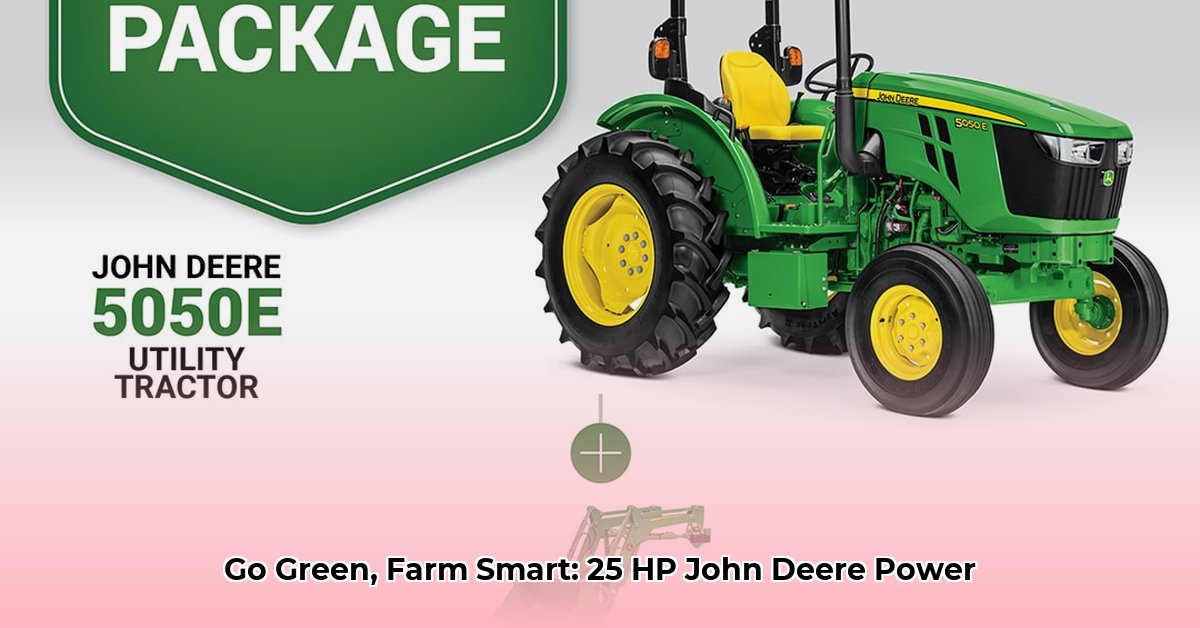
25 HP John Deere Tractor: Your Path to Greener Farming
Considering eco-friendly and profitable farming practices? A 25 horsepower John Deere tractor, often part of the 3 Series, offers a compelling solution. Its efficiency, ease of use, and versatility contribute significantly to sustainable agricultural operations. For more powerful options, check out the 35 HP John Deere Tractor.
Fuel Efficiency: Saving Money and the Planet
This compact tractor boasts impressive fuel economy. Advanced features like the common rail system (CRS) and precise fuel injectors optimize fuel consumption, leading to lower operating costs and a reduced carbon footprint. Isn't maximizing efficiency and minimizing environmental impact a win-win?
The automatic diesel particulate filter (DPF) cleaning system further enhances sustainability. This self-regulating system minimizes maintenance time and keeps emissions low, promoting cleaner air. How does simplified maintenance and reduced emissions impact your overall farming strategy?
User-Friendly Design: Effortless Operation
The 25 HP John Deere tractor prioritizes ease of use. Features like the Twin Touch™ foot pedals and the intuitive hydrostatic transmission (HST) system contribute to smooth and comfortable operation. Reduced operator fatigue translates to increased efficiency and improved overall workflow. What is the impact of intuitive controls on your farm's productivity?
This user-friendly design allows farmers to focus on their work rather than grappling with complex machinery. The tractor becomes a seamless extension of your farming skills.
Long-Term Sustainability: A Lifecycle Perspective
Assessing the sustainability of any piece of equipment requires a broad perspective—a lifecycle assessment (LCA). This holistic view analyzes the environmental impact throughout the tractor’s entire lifespan, from material sourcing and manufacturing to eventual disposal or recycling. While comprehensive LCA data for this specific model may not be publicly available, considering these factors is crucial for adopting truly sustainable practices. How does understanding a tractor's complete lifecycle affect your purchasing decisions?
Consider the entire impact of this tractor from product creation to its end of life. This is key to creating a sustainable farm.
Versatility and Adaptability: A Multi-tasking Machine
Despite its compact size, the 25 HP John Deere tractor is incredibly versatile. It efficiently handles various tasks, including tilling, mowing, and light hauling. Its maneuverability is particularly advantageous in smaller fields or confined spaces. What is the impact of this tractor's versatility on the types of work you can perform?
This multifunctional design significantly enhances its value as a sustainable farming tool.
Actionable Steps for Sustainable Farming
Ready to implement sustainable farming practices? Follow these steps:
- Assess Your Needs: Carefully evaluate your farm's specific needs and the tasks requiring mechanization.
- Compare Tractor Models: Research different tractor models and their features, comparing specifications and prices.
- Budget Accordingly: Include regular maintenance costs within your budget to ensure longevity and efficiency.
- Explore Financing Options: Investigate various financing options to facilitate your purchase.
- Integrate Sustainable Techniques: Combine the tractor's capabilities with environmentally conscious farming methods for optimal results.
Protecting Your Investment: Maintenance and Lifecycle Management
Regular maintenance is essential for maximizing the tractor's lifespan and minimizing environmental impact. This preventative approach reduces downtime, fuel consumption, and the potential for costly repairs. These actions not only help to protect your investment but also contribute to more sustainable practices.
| Technology/Component | Potential Problem | Mitigation Strategy |
|---|---|---|
| DPF/DOC System | Filter clogging | Regular maintenance, prompt attention to warnings |
| HST System | Hydraulic leaks | Regular fluid checks and preventative maintenance |
| Fuel System | Fuel contamination | Use high-quality fuel, replace filters regularly |
| Engine | General wear and tear | Adhere strictly to manufacturer's maintenance schedule |
Dr. Emily Carter, Agricultural Engineer, Purdue University, emphasizes: "Investing in preventative maintenance isn't just about saving money; it's a core element of responsible environmental stewardship in farming."
Lifecycle Assessment: A Deeper Dive
A lifecycle assessment (LCA) considers the entire journey of your John Deere 3025E, from manufacturing to disposal. Optimizing this lifecycle minimizes environmental impact.
Preventive Maintenance: The Foundation of Sustainability
Regular maintenance is crucial for both economic and environmental reasons. It prevents pollution and ensures efficient operation.
The Value of Original Equipment Manufacturer (OEM) Parts
Using OEM parts ensures optimal performance, extends the tractor’s life, and minimizes waste compared to cheaper, potentially less durable, aftermarket components.
Fuel Efficiency and Emissions Reduction
Implementing fuel-efficient operating practices directly reduces your farm's carbon footprint.
Responsible Disposal and Recycling
Plan for responsible disposal and recycling at the end of the tractor's useful life to minimize environmental impact.
Looking Ahead: Planning for the Future
Planning ahead, considering potential repairs and eventual replacement, enhances your farm's long-term sustainability.
By thoughtfully considering these factors, you can significantly enhance the environmental sustainability of your farming operation through the responsible use of a 25 HP John Deere tractor. This investment paves the way for a more prosperous and environmentally conscious agricultural future.